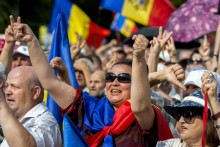A continous campaign has started in Chisinau for the resignation of Moldova leadership. The rally, organized by Demnitate Si Adevar (“Dignity and Truth”) civil platform in the Great National Assembly Square, had been attended by tens of thousands of people. Several sources have claimed this to be the largest protest action in Chisinau in the past 25 years.
The protesters’ demands were as follows: resignation of President Nicolae Timofti and the head of parliament Adrian Candu; holding of direct presidential elections (under the current legislation, the president is elected by the deputies); appointment of the government of popular trust, which would organize the early parliamentary elections no later than March 2016; removal of oligarchs from power; relocation of one billion dollars back to the state budget – the money were reported missing from one of the Moldovan banks in the spring.
In the evening news, the First Russian Channel was happy to inform their gullible audience that this demonstration was directed against Moldova’s entry into the European Union – but the extreme shamelessness of Russian journalists no longer can surprise us.
In late August, I was in Moldova – namely, in the capital of Gagauzia, Comrat. Almost everyone whom I spoke with mentioned the stolen billion, stating that such an amount is quite significant for the small country’s economy and that the West will not be able to ignore theft on such a large scale.
The protest had been building up for a long time, and on September 6 the streets of Chisinau saw many people rallying (according to various estimates, there were from 50 to 100 thousand). In the center of the capital tents have been pitched, and the organizers hope for further mobilization of a human resource to their cause if needed, which would ensure compliance with the protesters’ requirements.
The development of the events will be known in the coming days, but there is no doubt in one thing: the protest wave will have various Moldovan politicians, parties, and social movements trying to prove themselves.
For the pro-Russian movements and parties the chips are down. Russia will not hesitate to use a slightest chance in order to destabilize the situation in Moldova. Their pocket parties and NGOs will start working off their investments – as the Moldovan Socialists have already partially demonstrated.
Whereas everything is crystal clear about Transnistria, which keeps drifting on the ice floe of the “Russian world,” the intrigue still preserves on what Gagauzia will do in that political crisis. The autonomy, which is traditionally considered pro-Russian, had elected a new governor a few months ago. Irina Vlah had won a crushing victory at the first round of the election and became the first woman to hold this position of power.
It is well known that the Kremlin is making the instruments of their influence upon the new independent states not only from unrecognized breakaway territories, but also from the established autonomy and national movements. Under Putin, unrecognized republics and autonomies became an instrument of politics utilized for the Soviet empire restoration through the involvement of post-Soviet states into the Customs and the Eurasian unions.
Pro-Russian sentiments in Moldova are strong, but they are particularly strong in Gagauzia, where a “Russian card” is being played.
Yet there are other opinions. “Irina Vlah is a polician of the new formation. Political influence of the Kremlin on the autonomy’s leadership is greatly exaggerated and fueled by the election rhetorics. She has yet the most important thing – the time and the people’s trust. If the elected governor puts these resources to a good use, I believe that she will be able to achieve balanced relations with Chisinau and at the same time get rid of the ‘satellite of Moscow’ label,” says Yurii Dimchoglo, Odesa Oblast Council deputy of Gagauzian origin.
Indeed, there are exceptions. Moscow’s position may not always be decisive, and the closest example of that was the election of the Transnistrian president in 2011, in which Anatoly Kaminsky, the candidate openly supported by the Kremlin, had lost to the independent candidate Yevgeny Shevchuk. This lapse did not cost the Kremlin too much, because whomever becomes the president on the left bank of the Dniester, he or she would not be able to escape the clutches of Moscow.
Economically weakening Russia will soon see its most trusted friends run away. This happens when the gold reserves are depleting, and the friendship is harder to buy when the coin rings not so loud. Few want to be Putin’s pawns, because pawns are usually the first to die.
Being in Gagauzia, I have not seen any desire to die whatsoever in the people. On the contrary, everyone is full of vitality and thinks about the future. The vine may not look like that just yet, but it promises to yield some good grapes.








